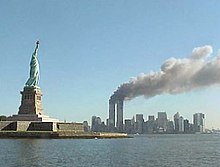Terrorism
Terrorism is the use of fear and violence for political, religious or ideological reasons. Many different types of social or political organizations might use terrorism to try to achieve their goals. People who carry out terrorism are called terrorists. The foundation of modern terrorism is the work of Sergey Nechayev, a Russian radical who developed strategies for carrying out terrorism, which also includes politics.

Overview
changeIt is difficult to explain terrorism. Terrorism has no official criminal law definition at the international level.[source?] Common definitions of terrorism refer to violent acts which are intended to create fear. The acts may be done for a religious, political or ideological motive and use illegal violence.[1][2] Some definitions now include acts of unlawful violence and war crimes. The use of similar tactics by criminal gangs is not usually called terrorism. The same actions may be called terrorism when they are done by a politically-motivated group.
There are over 10000 definitions of "terrorism". In some cases, the same group may be described as "freedom fighters" by its supporters and "terrorists" by its opponents. The term is often used by states to criticize political opponents.
One form of terrorism is the use of violence against noncombatants for the purpose of gaining publicity for a group, cause, or individual.[3][4] According to Memorial Institute for Prevention of Terrorism, terrorists killed 20,498 people in 2006. The major effect of terrorism comes from the fear that is generated.[source?]
Counter-terrorism
changeCounter-terrorism is broad in scope. Specific types of counter-terrorism include:
- Preemptive or reactive military action.
- Fortification and other technical means.
- Increased intelligence and surveillance activities. Often facilitated and rubber stamped with legislation like the United States Patriot Act.
- Preemptive humanitarian activities.
- More permissive interrogation and detention policies for the suspected terrorists.
Context
changeThe more modern governments restrict weapons to their military, the more ordinary people are helpless against terrorists.
The Global Terrorism Database (University of Maryland, College Park) has recorded more than 61,000 incidents of non-state terrorism. These caused at least 140,000 deaths between 2000 and 2014.[5]
Sources
change- Zero: the story of terrorism. Payne, Robert. 1941.
- Revolutionary war in world strategy 1945.. Sir Robert Thompson 1970. London. SBN 430 52051 6
- Low intensity operations. Kitson, Frank. Faber, London. 1971. ISBN 0 571 0901 0
- Greig, Ian. 1973 Subversion: propaganda, agitation and the spread of people's war. Stacey, London. IBSN 0 85468 495 6 .
Related pages
changeReferences
change- ↑ "Terrorism". Encyclopædia Britannica. p. 3. Retrieved 2006-08-11.
- ↑ Ruby, Charles L. (2002). "The Definition of Terrorism" (PDF). Archived from the original (PDF) on 2011-07-25. Retrieved 2010-02-22.
- ↑ Pentagon attack
- ↑ "Flight 77, Video 2". Judicial Watch. Archived from the original on 2009-02-12. Retrieved 2010-05-31.
- ↑ "Global Terrorism Index 2015" (PDF). Institute for Economics and Peace. p33. Archived from the original (PDF) on February 7, 2019. Retrieved July 19, 2016.